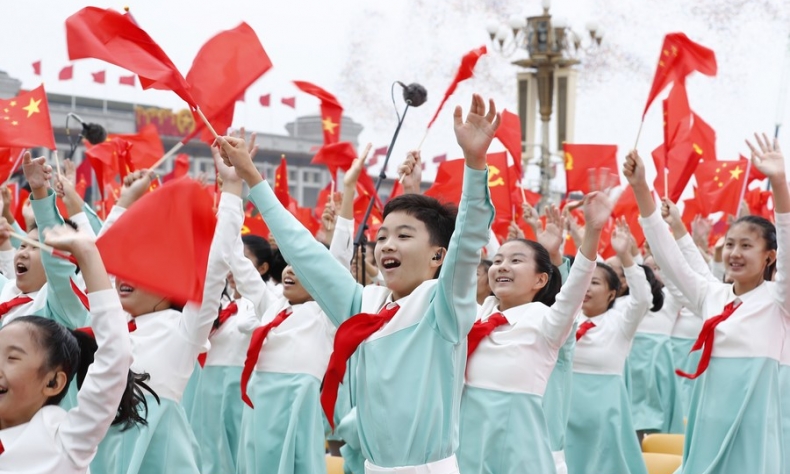CPC Has Delivered Historical Improvements for Humanity

The CPC produced the greatest improvement in the conditions of the largest proportion of humanity in history. That is not rhetoric, it is just the record of the past 100 years.
When looking at the 100th anniversary of the founding of the Communist Party of China (CPC), people in China naturally look first from a national viewpoint. In essence, the CPC made a promise to the Chinese people: If the methods and organization the CPC proposed were adopted, China would be lifted up out of the incredible national suffering, disintegration and humiliation it suffered in the century after Britain, followed by other Western countries and then Japan, began their aggression against China in the 1840s.
The meaning of Mao Zedong’s famous words in 1949 when the People’s Republic of China was founded, that “The Chinese people have stood up,” was not one of China’s superiority to other countries. Instead, it was a promise that in every respect – economic, political, social, cultural, moral – China’s national rejuvenation would restore it to full equality with every other country.
It is obvious that this promise of national rejuvenation by the CPC has been kept. After a century in which foreign armies almost continuously trampled across China, China has become a powerful state which no country would dare attack. After 1949, for the first time in many generations, the Chinese people would now decide their own fate.
But it is also worth viewing the CPC in an international context. First, because that is how the more than 80% of the rest of the world’s population will judge it. Second, because accurate judgment casts further light on the nation’s development.
The simple reality is that internationally speaking, the CPC has been responsible for improving the living conditions of the largest proportion of humanity in history. That is not a rhetorical overheated statement – it is simply a statement of fact, and one which has huge implications for China and the world.
To start with the social reality. In 1949 China was almost the world’s poorest country – only 10 countries had a lower per capita GDP. By 2022-23, China will become a “high income” economy by World Bank international standards. In just over 70 years, a single lifetime, China will have gone from almost the world’s poorest country to a high-income economy – with all the enormous improvements in living standards, life expectancy, education, culture and numerous other dimensions of human welfare this results in.
To understand the full implications of this achievement, it is only necessary to note that just 16% of the world’s population currently lives in high income economies, while China represents 18% of the global population. China, led by the CPC, will therefore have delivered the living standards of a high-income economy to a larger share of the world than all existing high-income economies put together.
No other country has even come close to delivering the benefits of such economic development to such a large swath of the world. When the U.S. achieved sustained rapid economic growth, after its Civil War, it was home to just 3.2% of the world’s population. When Soviet rapid industrialization began in 1929, the USSR contained 8.4% of the world’s population. But China in 1978, when more than four decades of globally unequalled economic development began, represented 22% of the world’s population.
Most importantly, such economic development directly produced enormous improvements in ordinary Chinese people’s living conditions. Since 1978, China’s household consumption has increased by 1,800% – twice that of any other major country.

China has eliminated absolute poverty, lifting 853 million people from poverty by international World Bank standards – which is three out of four lifted out of poverty globally.
The best indicator of a country’s overall living conditions is average life expectancy. More than 70% of average life expectancy is explained by per capita GDP, while the rest is down to other factors such as health care, education, environmental conditions. In China, people live two years longer than would be expected from its per capita GDP – demonstrating that its overall social conditions are even better than its enormous economic development.
These facts precisely show, as noted, that the CPC’s policies have been responsible for creating by far the greatest improvement in the conditions of the greatest proportion of humanity in human history.
This unparalleled improvement in people’s lives was achieved in two different, but related, waves. From 1949-1978, the basis of China’s economic achievement was laid in the creation of the foundations of modern industry. During this period, life expectancy in China rose eight years, to five years higher than the world average, representing an immense step forward.
With the introduction of the reform and opening-up policy in 1978, China achieved the fastest economic growth ever achieved by a major country – averaging 9.2% annual GDP growth between 1978-2020. The “socialist market economy” was in line with Marx, but also a historically unprecedented practical economic system. The CPC’s success was therefore not purely practical but also based on theory.
In summary, the CPC not only delivered on its promise to the Chinese people. It produced the greatest improvement in the conditions of the largest proportion of humanity in history. That is not rhetoric, it is just the record of the past 100 years.
John Ross is Senior Fellow at Chongyang Institute for Financial Studies at Renmin University of China.
 Facebook
Facebook
 Twitter
Twitter
 Linkedin
Linkedin
 Google +
Google +










